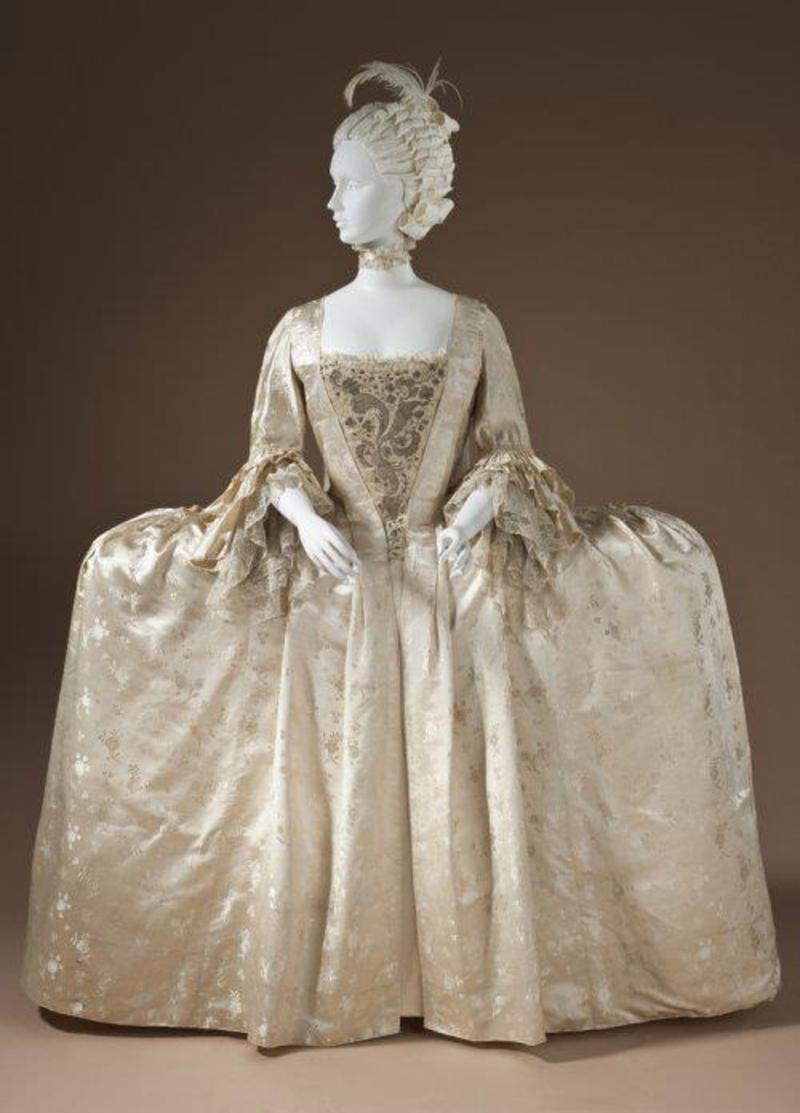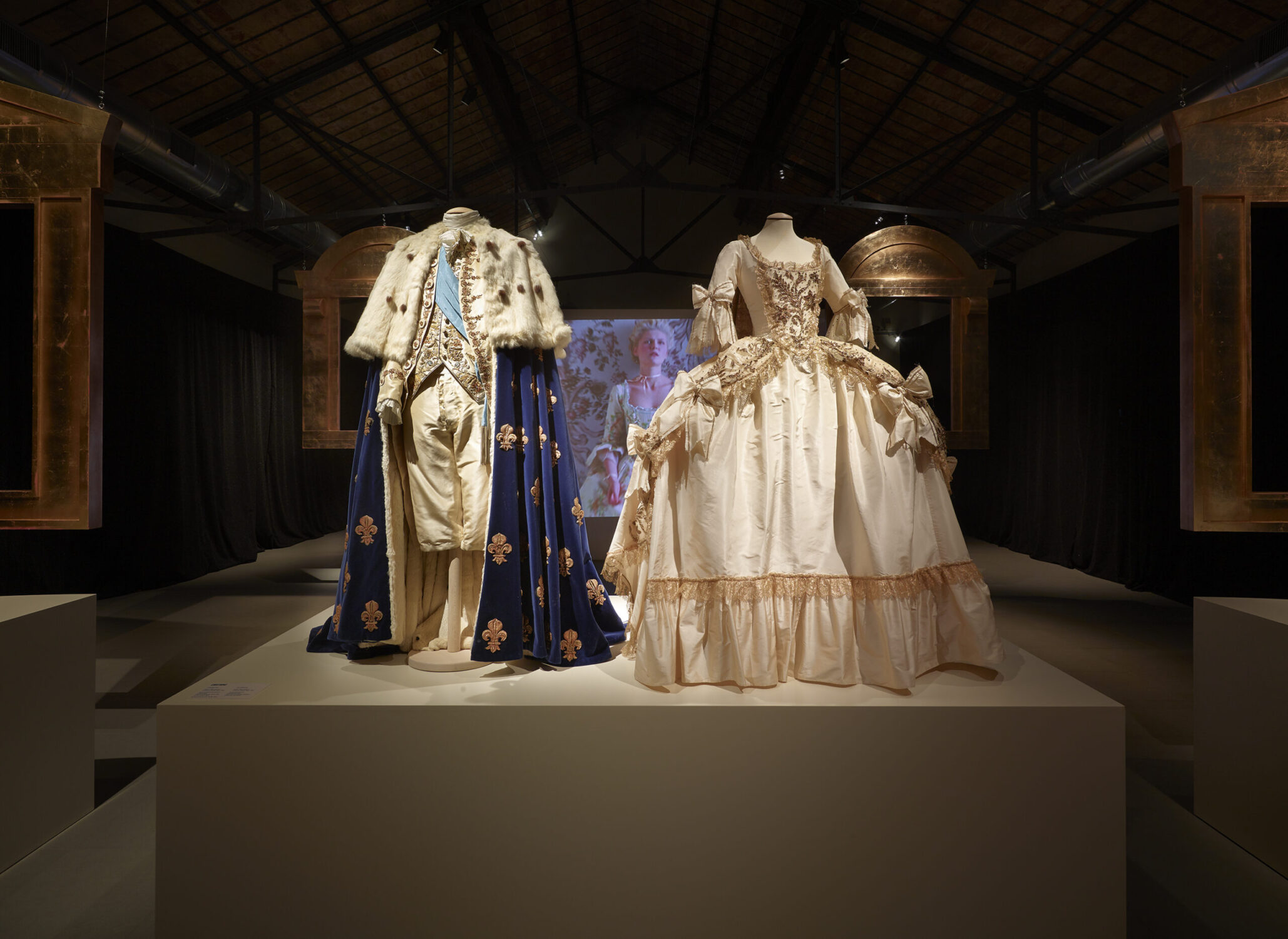
This gown supposedly belonged to Marie and designed by Rose Bertin. it is in the
One iconic figure stands out in this century when modern fashion was born: the marchande de mode, or dressmaker/milliner, whose most famous representative was Rose Bertin, Marie-Antoinette's 'minister of fashion'. Bertin captured royal and princely clienteles not only at Versailles, but in other European courts as well.

Marie Film Costumes at Prato Textile Museum ArtTravArtTrav
Oʻzbekcha / ўзбекча [1] [maʁi ɑ̃twanɛt]; Marie Antoinette Josèphe Jeanne; 2 November 1755 - 16 October 1793) was the last queen of France. She was born an archduchess of Austria, and was the penultimate child and youngest daughter of Empress and Emperor .

Norma Shearer "Marie gold gown from the movie. Displayed at Los Angeles County
In the portrait (Fig. 3), Queen Marie Antoinette is posing wearing a robe à la francaise of very expensive and high quality fabrics. Marie Antoinette's court dress is detailed with gold fringes, gold tassels, both fabric and ribbon bows, and lace ruffles down her sleeves and mid corset. Embroidery or printing was usually applied after the.

Neu Marie Original Kleider
Fashion at Versailles: "For her" Fashion at Versailles continues to inspire notable contemporary designers. Decrypting its symbolic trends which emerged in the 1780s, around the iconic figure of.

Vintage Outfits, Vintage Gowns, Vintage Fashion, Rococo Fashion Modern, Vintage Ladies, Antique
Photo: Wikipedia/Public Domain. In 1783, portrait artist Élisabeth Louise Vigée Le Brun painted Marie Antoinette in a simple cotton gown known as a robe de gaulle. The thin white fabric is airy.

Domaine De Marie Dans Le Parc Du Palais De Versailles Photo stock Image du
Nov. 1, 2012. Blockbusters come in all shapes and sizes. Some, festooned with marquee names and masterpieces, can be seen from miles off. Others sneak up on cat's feet, unsuspected and.

Marie GownRoyal Ontario Museum My Frugal Lady
É. lisabeth Louise Vigée Le Brun (1755-1824) was a French painter active between 1775-1825. Her style, which attracted royalty and aristocrats across Europe, eventually became associated with that the tastes of Marie Antoinette and the ancien régime (Nicholson). She first painted Marie Antoinette in 1778 and became her official court painter shortly thereafter, painting about 30 portraits.

Marie The Line of Clothing Rendering for Costume Design LibGuides at Bennington
Sené and Chatard were principle chair makers and gilders to Louis the XVI and Marie Antoinette, who was well known for her lavish, extravagant tastes. Left to right: Armchair before conservation treatment, with 1970s upholstery and blue paint. Armchair after treatment, Jean-Baptiste-Claude Sené, about 1785 - 1790, France.

'Marie dress, Rochas par Olivier Theyskens Idées vestimentaires, Robes d'époque
In 1926, Coco Chanel launched the little black dress, which would soon become, said American Vogue, "a sort of uniform for all women of taste." Nearly 150 years earlier, however, there had been a similar fashion revolution when Élisabeth Louise Vigée Le Brun depicted the stylish Marie Antoinette in a simple white muslin dress. In the new Masterpiece in Focus exhibition opening May 27 at.

ROBES de MARIE
The Museum's 2018 season opens with a major exhibition dedicated to the costumes from the film Marie Antoinette by Sophia Coppola. Milena Canonero, a world-renowned costume designer, created these extraordinary garments and won an Oscar for this production in 2007. Critics consider the costumes to be the best cinematographic reinterpretation of eighteenth-century apparel ever created.

Marie museum Madame Tussaud Vienna Rococo fashion, Historical dresses, 18th
On 19 April 1770, Marie-Antoinette left Vienna, travelling to France to meet her future husband in a train of 132 people, spread between 57 carriages driven by 376 horses — ordered by her future father-in-law Louis XV and the French ambassador. Two days before, a proxy wedding had been held for Marie-Antoinette in Austria — the King himself.

Marie Dress Real white dress
Marie Antoinette was now the most hated woman in France. All that was left was to imprison her in a cage. On July 14, 1789, the Bastille, a fortress prison in Paris, fell to an angry mob. Marie Antoinette and Louis XVI tried to escape to Austria in 1791. But they were caught near the border and taken to Paris.

Marie The Oscarwinning Costumes Of A Queen Museo del Tessuto
January 20, 2018 Portrait of Marie Antoinette, by Jean-Baptiste Gautier-Dagoty, 1775, Palace of Versailles, France. Photo: Getty Images Marie Antoinette is generally associated with excess..

Wax figure of Marie located at the Musée Grévin in Paris, France. Marie
Marie-Antoinette (after 1783) by after Élisabeth-Louise Vigée Le Brun National Gallery of Art, Washington DC. In 1783 Vigée Le Brun scandalously exhibited this portrait of the Queen wearing a fashionable muslin chemise. The simple white dress closely resembled period underwear, so was deemed unsuitable for royalty. LIFE Photo Collection.

Marie Dress Fashion history, 18th century fashion, Fashion
Marie-Antoinette's Dress Added: August 29, 2012 - 16:44 Embellished with silk embroidery, ribbon appliqués, spangles and glass stones, Marie-Antoinette's lavish dress is restored to its original splendour at the Royal Ontario Museum. Tags: Research No transcript available. Related Videos & Podcasts

Neu Marie Original Kleider
Marie Antoinette was rumored to have had 300 dresses made for her each year, and she never wore anything twice. Many of these dresses would have been the formal robe à la Française, which were already in fashion by the time the young Austrian Archduchess arrived at Versailles.